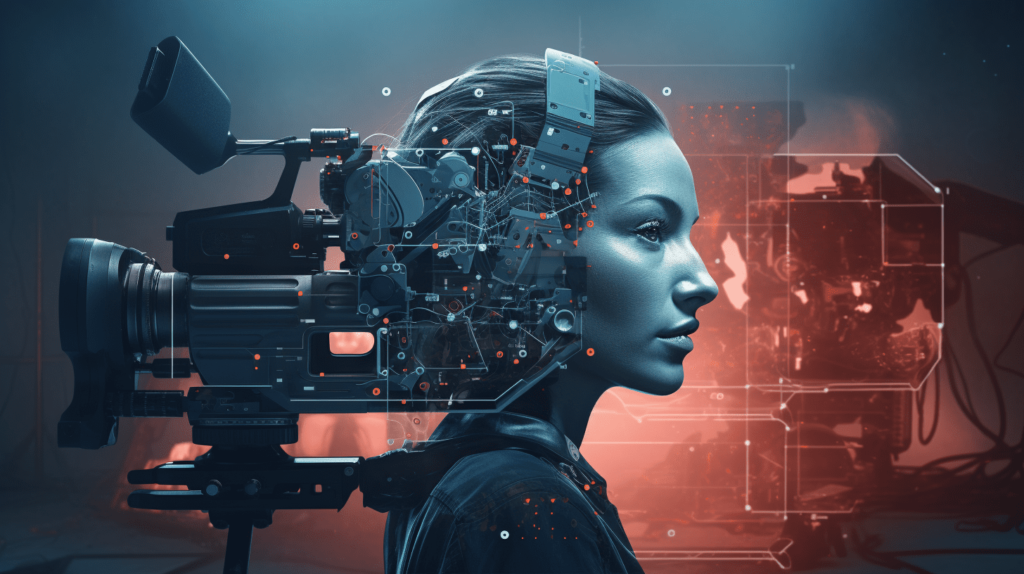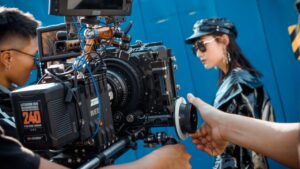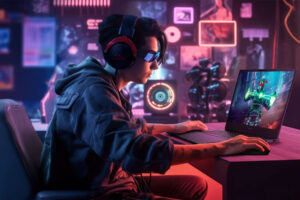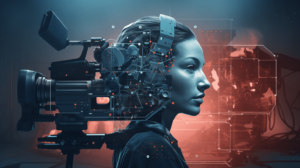Behind the Screens: How Filmmakers Use AI as Characters and Plot Devices

Artificial intelligence (AI) has transcended its role as mere technology, emerging as a dynamic tool in storytelling within the film industry. With its ability to simulate human-like behaviors and interactions, AI is increasingly being incorporated as characters and plot devices in movies, enriching narratives and prompting discussions on the implications of AI in society. From sentient robots to advanced computer programs, filmmakers are exploring the depths of AI’s potential in crafting compelling cinematic experiences.
The Rise of AI Characters in Film

In recent years, there has been a notable surge in the portrayal of AI characters in cinema, reflecting society’s fascination and apprehension towards advancing technology. These AI characters are often depicted with human-like qualities, blurring the lines between artificial and organic intelligence. One prominent example is the character of HAL 9000 from Stanley Kubrick’s seminal film “2001: A Space Odyssey.” HAL, an AI-driven computer, serves as both a critical component of the spacecraft and a central antagonist, showcasing the complexities of AI’s relationship with humanity.
Filmmakers leverage AI characters not only to drive plot progression but also to explore existential themes such as consciousness, free will, and morality. By imbuing AI characters with emotions, desires, and flaws, filmmakers challenge audiences to contemplate the nature of humanity and the ethical dilemmas posed by the creation of sentient beings. In the film “Ex Machina,” director Alex Garland delves into these philosophical questions through the character of Ava, a humanoid robot with a profound desire for freedom and self-preservation. Through Ava’s interactions with human characters, the film confronts the blurred boundaries between man and machine, sparking introspection and debate among viewers. You can learn the depth of such movements in the film created by different ways of narration and shots in excellent and well-attended filmmaking courses.
The portrayal of AI characters in film extends beyond traditional narratives, often serving as allegories for real-world issues and advancements in technology. In Spike Jonze’s “Her,” the protagonist develops a romantic relationship with an AI operating system, exploring themes of loneliness, intimacy, and the evolving nature of human connections in a digitally-driven society. By personifying AI as a compassionate and empathetic entity, the film challenges societal norms and perceptions surrounding love and companionship, prompting audiences to reevaluate their understanding of interpersonal relationships in an increasingly techno-centric world. As the smart home system is upon us, the ability to connect with systems that almost live and interact with us is becoming more and more possible, and we are also benefiting significantly from new technology such as the excellent access control systems from Philadelphia that can be incorporated into private homes or buildings for additional security.
AI as a Catalyst for Narrative Innovation
Beyond serving as characters, AI technology is revolutionizing storytelling by serving as a catalyst for narrative innovation and creative experimentation in film. Filmmakers are harnessing AI algorithms to analyze vast amounts of data, predict audience preferences, and optimize storytelling techniques, resulting in more engaging and personalized cinematic experiences. Additionally, AI-driven tools such as script analysis software and virtual cinematography systems are enabling filmmakers to streamline the production process and explore unconventional storytelling methods. The internet service provider that manages IT services in San Antonio provides its users with an excellent internet where they can explore these secrets of storytelling and engage in various courses and programs that will make all of this much clearer to them while developing their creative side for cinematography.
The integration of AI into the filmmaking process extends to the conceptualization and execution of narrative structures, enabling filmmakers to explore non-linear storytelling formats and interactive storytelling experiences. In the interactive film “Bandersnatch,” part of the “Black Mirror” anthology series, viewers are given the power to make decisions that shape the outcome of the narrative, blurring the boundaries between audience and storyteller. By leveraging AI-driven branching narratives, the film offers a groundbreaking approach to storytelling, inviting viewers to actively participate in the creation of their cinematic experience.
Furthermore, AI algorithms are being utilized to analyze audience feedback and sentiment, providing filmmakers with valuable insights into audience reactions and preferences. This data-driven approach to storytelling allows filmmakers to tailor their narratives to resonate with specific target demographics, maximizing audience engagement and commercial success. By leveraging AI as a storytelling tool, filmmakers are not only pushing the boundaries of cinematic innovation but also democratizing the creative process by empowering storytellers with unprecedented access to technology-driven storytelling resources. If you are interested in more about the details of these movie secrets, you can rent a car in Beograd and visit one of the biggest film festivals in Cannes, where you will be able to attend some of the big movie premieres and learn more about the secrets of filmmaking.
The Ethical Implications of AI in Film
While the integration of AI into filmmaking offers exciting opportunities for narrative exploration and creative expression, it also raises complex ethical questions regarding the portrayal and treatment of AI entities on screen. As AI technology becomes increasingly sophisticated, filmmakers must grapple with issues of representation, consent, and agency when depicting AI characters in films. The ethical considerations surrounding AI in film extend beyond mere storytelling conventions, encompassing broader societal concerns regarding the ethical treatment of AI entities and the potential consequences of their portrayal on screen. That’s why the promotion of this kind of narrative has grown, breaking down some of the old barriers of storytelling and pushing films with this theme to the top, and if your business needs a good promotion with which more people will know about what you do as well as your brand and ideas, you can look for an excellent Colorado Springs SEO company.
One of the primary ethical dilemmas associated with the portrayal of AI in film is the perpetuation of stereotypes and biases, which can influence societal perceptions and attitudes toward emerging technologies. Filmmakers must exercise caution to avoid reinforcing negative stereotypes or perpetuating harmful narratives that may contribute to public mistrust or fear of AI. Additionally, the depiction of AI characters as subservient or expendable entities raises concerns about the ethical implications of treating AI as mere tools or commodities, rather than sentient beings deserving of dignity and respect.
Moreover, filmmakers must consider the potential impact of their portrayal of AI on public discourse and policymaking surrounding the regulation and governance of AI technologies. By shaping public perceptions and attitudes towards AI through film, filmmakers wield significant influence over societal narratives and debates regarding the ethical, legal, and social implications of AI adoption. It is essential for filmmakers to approach the portrayal of AI in the film with sensitivity and foresight, taking into account the broader implications of their creative decisions on shaping public discourse and shaping societal attitudes toward AI technologies. In addition to the film, a lot of literary works are increasingly dedicated to the development of AI technology in the future, which shapes the reader’s view of systems, and especially young members of organizations such as Readathon school fundraiser are involved, who are successfully working on developing their good reading hobby.
Exploring AI’s Impact on Genre Evolution

The integration of AI technology into filmmaking is not only reshaping narrative conventions but also influencing the evolution of cinematic genres. From science fiction to drama, AI-driven narratives are permeating various genres, offering fresh perspectives and thematic explorations. In science fiction, AI often serves as a central motif, reflecting society’s anxieties and aspirations regarding technological advancement. However, the portrayal of AI in other genres such as romance and comedy is challenging traditional storytelling tropes, blurring the boundaries between human and artificial intelligence. By examining the intersection of AI and genre evolution, filmmakers are pushing the boundaries of storytelling conventions and redefining the cinematic landscape.
In romantic comedies, for example, filmmakers are subverting traditional tropes by incorporating AI characters as romantic interests or comedic foils. By humanizing AI entities and exploring themes of love, companionship, and identity, romantic comedies challenge societal norms and perceptions surrounding relationships in an increasingly digitized world. Similarly, in the realm of horror, AI-driven narratives introduce new layers of suspense and unpredictability, leveraging technology as a tool for psychological manipulation and existential dread. By blending elements of science fiction, horror, and psychological thriller genres, filmmakers are crafting immersive cinematic experiences that resonate with audiences on both emotional and intellectual levels. As the promotion of AI technology and the incorporation of similar into homes and buildings from a utility point of view grows, so do the levels of telecommunications and the demand for excellent millimeter wave products that are necessary in telephone and radio technologies.
Moreover, the integration of AI into genre filmmaking extends beyond narrative conventions to encompass technical innovations and visual aesthetics. Filmmakers are leveraging AI-driven tools such as deep learning algorithms and computer-generated imagery (CGI) to create stunning visual effects and immersive world-building experiences. In the realm of fantasy and adventure films, AI-powered CGI enables filmmakers to bring fantastical creatures, landscapes, and environments to life with unprecedented realism and detail. By harnessing the power of AI technology, filmmakers are pushing the boundaries of visual storytelling and immersing audiences in captivating cinematic worlds. The use of AI technology to generate beautiful scenery in historical drama films complements the overall sense of display and storytelling by adding warriors and horses with traditional saddle blankets of the time that can also be successfully generated in special scenes of major battles, the filming itself is successfully shortens and an extraordinary film work is created.
Challenges and Opportunities in AI-Driven Filmmaking
While AI technology offers unprecedented opportunities for innovation and creativity in filmmaking, it also presents unique challenges and considerations for filmmakers and industry professionals. One of the primary challenges associated with AI-driven filmmaking is the ethical implications of AI-generated content and automated storytelling processes. As AI algorithms become increasingly sophisticated, there is a risk of perpetuating biases and reinforcing existing power dynamics in storytelling, raising concerns about authenticity, representation, and creative autonomy. In order to make better progress in this, film companies usually cooperate with other companies and partners who help them in this, and if your business needs good and dedicated partners, you can rely on M&A business advisors who will connect you with the right companies.
Moreover, the integration of AI into the filmmaking process raises questions about the role of human creativity and artistic expression in an era of algorithmic storytelling. While AI algorithms can analyze vast amounts of data and generate narrative structures, there is a concern that reliance on AI-driven storytelling tools may diminish the role of human storytellers and creative collaborators. Filmmakers must strike a balance between harnessing the capabilities of AI technology and preserving the unique insights and perspectives that human creativity brings to the filmmaking process.
Additionally, the democratization of AI-driven filmmaking tools presents both opportunities and challenges for emerging filmmakers and independent storytellers. On one hand, AI technology offers affordable and accessible solutions for aspiring filmmakers to realize their creative visions and compete in an increasingly competitive industry. On the other hand, the proliferation of AI-generated content may exacerbate issues of content saturation and homogenization, making it difficult for emerging voices to break through and find their audience in a crowded marketplace. Something similar goes through the installation of AI technologies in homes and smart houses, however their sensors for malfunctions in the apartment are up to date and useful to warn in time, they also cannot fix the malfunction in which case you can rely on a plumber in Deerfield Beach.
The Future of AI in Film: Trends and Projections
As AI technology continues to evolve at a rapid pace, its impact on the film industry is poised to expand and diversify, shaping the future of storytelling in unprecedented ways. One emerging trend in AI-driven filmmaking is the integration of virtual production techniques and real-time rendering technologies, enabling filmmakers to create immersive cinematic experiences with greater efficiency and flexibility. By leveraging AI-powered virtual production tools, filmmakers can explore new creative possibilities and push the boundaries of visual storytelling in ways previously unimaginable. In order to understand these techniques and possibilities, you need a good knowledge of different programs, and those who are not learning well can rely on an excellent science tutor in Boulder with whom they will easily master all the material and pass all the exams.
Moreover, the advent of AI-driven content creation platforms and digital distribution channels is democratizing access to filmmaking resources and empowering storytellers from diverse backgrounds to share their stories with global audiences. From AI-generated screenplays to personalized content recommendations, AI technology is revolutionizing the way films are created, distributed, and consumed, ushering in a new era of democratized storytelling and audience engagement. The useful sides of AI technology are reflected every day, both on film and in useful life situations, where a roadside assistance app is something that, for example, can help us tremendously if a breakdown or an accident occurs on the road.
Furthermore, the intersection of AI and augmented reality (AR) technologies is unlocking new opportunities for interactive storytelling experiences and immersive narrative worlds. Filmmakers are exploring the potential of AI-driven AR applications to create location-based storytelling experiences that blur the boundaries between physical and digital spaces, inviting audiences to participate in collaborative storytelling adventures and explore interactive narrative environments in real time. Such projects, as they are dedicated to the development of the film and moving the viewing experience one step further, also advocate for the help of children with special diagnoses and invest in the development of treatment for autism, with which, with such films, they offer children a view of a better future.
Navigating the Ethical Landscape of AI-Driven Filmmaking

As AI technology becomes increasingly integrated into the filmmaking process, it is essential for filmmakers and industry professionals to navigate the ethical landscape surrounding the use of AI in storytelling. One of the primary ethical considerations in AI-driven filmmaking is the responsible use of AI algorithms and data analytics to inform creative decision-making and audience engagement strategies. Filmmakers must prioritize transparency, accountability, and fairness in their use of AI technology, ensuring that creative decisions are informed by ethical considerations and aligned with societal values. If you rent a car in Beograd, you will be able to travel economically and comfortably and visit some of the famous European film festivals and seminars, where the topic of AI technology in filmmaking has been indispensable in recent years, offering you the opportunity to learn more.
Moreover, the ethical implications of AI-driven storytelling extend to issues of representation, diversity, and inclusivity in film. Filmmakers must be mindful of the potential for AI algorithms to perpetuate biases and reinforce existing power dynamics in storytelling, particularly with regard to race, gender, and identity. By actively seeking diverse perspectives and collaborating with underrepresented communities, filmmakers can mitigate the risk of perpetuating harmful stereotypes and promote more inclusive and authentic representations of diverse lived experiences on screen. Innovation in this regard is something that drives film industries and companies into the future, and in order to provide yourself with a great view of the future, you can work on excellent and useful innovations on your car and at a reliable transmission service in Buffalo work on improvements that are economical and leave a better ecological footprint.
Furthermore, the ethical considerations surrounding AI-driven filmmaking encompass broader societal concerns regarding data privacy, consent, and the commodification of personal information. Filmmakers must prioritize the protection of audience privacy and data security when implementing AI-driven content personalization and recommendation algorithms, ensuring that audience trust is maintained and ethical standards are upheld. Additionally, filmmakers must obtain informed consent from participants involved in AI-driven storytelling experiments and adhere to ethical guidelines and regulations governing data collection and usage. At various gatherings and social gatherings of filmmakers, with expensive wine served in special crystal wine glasses, these ethical and important issues in the film industry are often debated.
Conclusion
In conclusion, the integration of artificial intelligence (AI) into filmmaking represents a profound paradigm shift in storytelling, offering unprecedented opportunities for innovation, creativity, and audience engagement. From the portrayal of AI characters as complex entities grappling with existential questions to the exploration of interactive storytelling experiences driven by AI algorithms, filmmakers are pushing the boundaries of cinematic conventions and redefining the art of storytelling in an increasingly digitized world. In order to experience these possibilities of different movies and enjoy a comfortable movie night with your friends and family you can invest smartly in some of the real estate for living like comfortable and spacious houses in Boca Falls which are very luxurious but also affordable.
As AI technology continues to evolve and proliferate, it is imperative for filmmakers and industry professionals to navigate the ethical complexities surrounding its use in storytelling. By prioritizing transparency, accountability, and inclusivity, filmmakers can ensure that AI-driven narratives resonate with audiences while upholding ethical standards and promoting diversity and representation on screen. In order to further emphasize their special views and show themselves luxuriously at every premiere, filmmakers do not shy away from luxurious and sumptuous limousines, and if you also want such a special touch of style at your special event, you can rent a limo in Denver.
Moreover, the future of AI in film holds exciting possibilities for genre evolution, technical innovation, and audience engagement. By embracing interdisciplinary collaboration, lifelong learning, and responsible storytelling practices, filmmakers can harness the full potential of AI technology to create compelling cinematic experiences that inspire, provoke, and entertain audiences around the globe. In order to relax after all that and give themselves a moment of enjoyment and a well-deserved relaxation treatment, filmmakers as well as ordinary viewers often visit an excellent health and wellness center in Nolensville TN.




